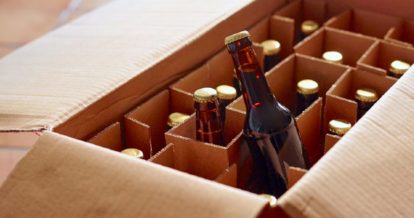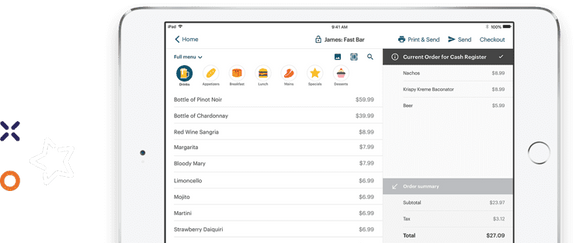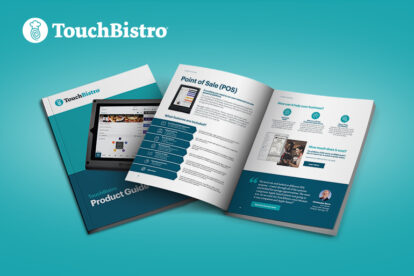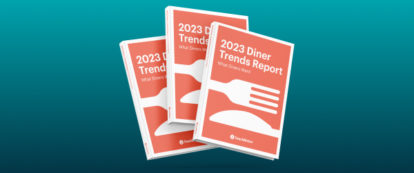Alcohol delivery laws introduced during the COVID-19 pandemic helped many restaurants stay profitable when foot traffic slowed due to dine-in restrictions. Now, many states and provinces have made these changes permanent after recognizing the many positive impacts of alcohol delivery, including boosting the average check size for takeout and delivery orders.
Of course, these rules differ considerably across North America and change frequently. While states like Iowa, Ohio, and Oklahoma have made alcohol delivery permanent, other states have made no changes to their liquor laws. The same is true in Canada, with provinces such as Ontario and Manitoba making the change permanent, while places like Nunavut and Yukon have not introduced any new laws.
Though red tape may still be an issue in some places, looser alcohol delivery laws have given restaurants a way to make the most of a valuable income stream. And with simple tools like TouchBistro Online Ordering, offering alcohol delivery is easier than ever before.
To help your restaurant navigate changing liquor laws and the new world of alcohol delivery, we’ll cover:
- Can restaurants deliver alcohol?
- Which U.S. states and cities allow alcohol delivery and pickup
- Which Canadian provinces allow alcohol delivery and pickup
- The benefits of alcohol delivery for your restaurant
- How restaurants are adapting to looser alcohol delivery laws
To jump ahead to a specific state, click the links below:
- Alabama
- Alaska
- Arizona
- Arkansas
- California
- Colorado
- Connecticut
- Delaware
- Florida
- Georgia
- Hawaii
- Idaho
- Illinois
- Indiana
- Iowa
- Kansas
- Kentucky
- Louisiana
- Maine
- Maryland
- Massachusetts
- Michigan
- Minnesota
- Mississippi
- Missouri
- Montana
- Nebraska
- New Hampshire
- New Jersey
- New Mexico
- New York
- North Carolina
- North Dakota
- Ohio
- Oklahoma
- Oregon
- Pennsylvania
- Rhode Island
- South Carolina
- South Dakota
- Tennessee
- Texas
- Utah
- Vermont
- Virginia
- Washington
- Washington D.C.
- West Virginia
- Wisconsin
- Wyoming
To jump ahead to a specific province or territory, click the links below:
- Alberta
- British Columbia
- Manitoba
- New Brunswick
- Newfoundland and Labrador
- Northwest Territories
- Nova Scotia
- Nunavut
- Ontario
- Prince Edward Island
- Quebec
- Saskatchewan
- Yukon
2023 U.S. Alcohol Delivery Laws By State
Early on in the pandemic, many states and municipalities were quick to relax delivering alcohol laws to help struggling restaurants boost sales of takeout and delivery orders. But while dining restrictions are no longer in place, rising food prices, inflation, and the increased cost of labor means that many restaurants could still benefit from the boost in average check size that alcohol to go can provide. The challenge is, alcohol delivery laws differ from state to state, which continues to cause confusion around what restaurants can and cannot do.
Below, we break down the most recent changes to state alcohol delivery laws by state.
Note: This list is current as of January 1, 2023. Please check with your current local ordinances before offering alcohol delivery or takeout.
Alabama
In March of 2020, the Alabama Beverage Commission (ABC) authorized restaurants and bars to sell alcohol to go. This order was then pulled back on September 15, 2020, as COVID-19 case numbers began to fall.
On December 14, the Alabama Alcoholic Beverage Board announced it would once again allow alcohol delivery and pickup from restaurants over the holidays. However, this emergency ruling expired on January 4, 2021.
On October 1, 2021 a new law went into effect to allow qualified businesses interested in delivering alcohol to file an application with the Alcohol Beverage Control Board. To participate, restaurants or bars must pay a non-refundable filing fee of $100 and a $250 license fee. If a venue is approved for alcohol delivery, there will be an option to use employees or third party contractors to deliver a limited amount of alcohol to homes.
As of yet, a handful of companies have signed up for delivery, with more expected to join in 2022.
On July 1, 2022, a new bill went into effect that would allow any licensed restaurants to purchase alcohol for off-premise consumption, including drive-thru and curbside pickup. As of January 1, 2023, this bill is still in effect.
For the latest updates on alcohol delivery in Alabama, check the Alabama Alcoholic Beverage Control Board’s website.
For the latest updates on alcohol delivery in Alabama, check the Alabama Alcoholic Beverage Control Board’s website.
Alaska
In April of 2020, Alaska’s alcohol board approved new rules allowing restaurants to deliver beer and wine alongside food deliveries. The new ruling came with several restrictions, including the fact that third-party delivery services like DoorDash or UberEats are not permitted to deliver alcohol.
The curbside sale and home delivery of alcohol in Alaska expired on November 15, 2020.
New regulations to extend alcoholic curbside and delivery on a permanent basis were signed and filed by The Lieutenant Governor on March 15, 2021.
The most recent updates are available from Alaska’s Alcohol & Marijuana Control.
Arizona
On Friday, March 20, 2020, the Arizona Department of Liquor Licenses and Control implemented Governor Ducey’s Executive Order allowing restaurants to offer alcohol for sale with delivery and takeout orders. Under this new rule, restaurant licensees were able to temporarily sell alcohol through delivery, pickup, and curbside service, provided that the beverages are in sealed containers.
However, part of Gov. Ducey’s executive order was struck down and restaurants with a series 12 liquor license (a “restaurant” license), were no longer permitted to sell alcohol to go.
As of January 2021, retail delivery of liquor was only permitted by bars (series 6 license), beer and wine bars (series 7 licenses), liquor stores (series 9 license), and beer and wine stores (series 10 license).
On May 21, 2021 Gov. Ducey signed House Bill 2733 to permanently legalize the sales of cocktails and other alcohol to go. The new law enables restaurants to deliver drinks to customers with the proper leasing agreements. To offer cocktails to go, restaurants have to apply by paying $200 to the Department of Liquor Licenses and Control (DLLC). If approved, the restaurant would be granted an automatic annual renewable lease for an additional $2,500.
Check Arizona’s Department of Liquor for the latest alcohol delivery rules.
Arkansas
On Thursday, March 19, 2020, the Arkansas Alcoholic Beverage Control issued a temporary rule allowing restaurants and microbreweries to sell beer and wine for off-site consumption for the next 30 days.
On January 19, 2021, the Senate Committee of City, County, and Local Affairs passed Senate Bill 32, allowing retail liquor permit holders to deliver alcohol directly to consumers. This new law only applies to retail liquor stores, a microbrewery restaurant, or a small brewery. At these establishments, alcohol can only be delivered by staff. No third-party delivery is permitted.
On April 14, 2021, Governor Asa Hutchinson signed Senate Bill 339 into law which would allow alcohol delivery permanently. Bill 339 went into effect January 1, 2022. Restaurants still need a valid alcohol beverage permit to sell alcohol to go in sealed containers and during legal operating hours. Under this bill, restaurants are still not allowed to sell alcohol on Sundays.
Check with the Arkansas’s Alcoholic Beverage Control for the lastest alcohol delivery and takeaway guidelines.
California
As of March 20, 2020, all restaurants in California were permitted to sell beer, wine, and pre-mixed drinks or cocktails for pickup or delivery, provided the drinks have a secure cap or lid (i.e. no openings for straws). Alcoholic beverages also had to be sold in conjunction with meals.
Any restaurant taking advantage of the new measures was also required to post a notice – either on the premises or online – that puts consumers on notice of limitations regarding open container laws. A printable version of the required notice can be found here.
As of October 8, 2021, the Governor approved Senate Bill 389, a measure that would allow establishments, including restaurants and bars, already selling alcohol to sell pre-made cocktails for pickup through December 31, 2026.
Unlike the previous provision, cocktails to go need to be picked up directly by the consumer, and delivery is not permitted. The restaurant, bar, or distillery must also sell food on its premises, and beverages have to be transported in a trunk, or in a vehicle that is not otherwise occupied by a driver or passengers.
You can check with California’s Alcoholic Beverage Control for the latest updates.
Colorado
In Colorado, restaurants are now able to deliver alcohol with food or sell it with takeout orders. This includes beer, wine, liquor, and mixed drinks. However, breweries or distillery pubs may not provide mixed drinks – only products manufactured on-site.
These temporary measures were passed by Colorado Governor Jared Polis and stipulated that alcoholic beverages must be served in sealed containers.
In July of 2020, Governor Polis signed a bill into law that allowed restaurants to continue selling alcoholic beverages for delivery and pickup until July 2021.
On June 22, 2021, Governor Pollis signed a new bill that allows restaurants to continue selling and delivering alcohol to go until July 1, 2025.
Check Colorado’s Liquor Enforcement Laws, Rules, and Regulations for further details and updates.
Connecticut
In Connecticut, Governor Ned Lamont signed an executive order allowing restaurants, bars, and breweries to start delivering alcohol. The order only applies to sealed liquor and does not permit the sale of cocktails made in-house.
In November of 2020, Governor Lamont extended the previously enacted provisions regarding alcohol to go and other provisions through February 9, 2021. Thanks to new legislation passed in June 2021, these provisions have been extended through June 4, 2024.
The latest updates are available from Connecticut’s Liquor Control Division.
Delaware
Two days after Delaware Governor John Carney shut down restaurants for dine-in service on March 16, 2020, he permitted restaurants, brewpubs, taverns, and taprooms to sell alcohol to go, including cocktails.
In June of 2020, a bill was signed into law allowing restaurants to continue to sell alcoholic beverages for take-out, curbside or drive-thru service through March 2021. It’s important to note that House Amendment 1 removed the requirements that takeout, curbside, or drive-thru orders needed to include complete meals, and that the cost for alcoholic beverages could not exceed 40% of the licensee’s total sales transactions.
On March 23, 2021, a new act was signed by the Governor to extend the previous provisions until March 31, 2022.
As of April 1, 2022, restaurants, brewpubs, taverns, and taprooms can permanently sell alcohol to go under House Bill 290. This new bill allows food and drink establishments to sell alcoholic drinks for curbside pickup, takeout, or drive-thru. Restaurants must sell a minimum of $10 worth of food as part of an alcohol to go order, and seal alcoholic drinks in a container.
For further updates, check with Delaware’s Office of ABC.
Florida
Following the lead of other states, Florida Governor Ron DeSantis announced that he would allow restaurants to deliver alcohol in sealed containers for off-premises consumption. Under Executive Order Number 20-71, alcohol must be ordered alongside food and anyone getting alcohol delivered will be required to show valid ID.
In December of 2020, new proposals were filed that aimed to make previous emergency orders permanent and allow any business with an alcohol license to continue selling packaged alcoholic beverages for off-site consumption.
On May 13, 2021, the program temporarily put in place in March was made permanent when the Governor signed the “alcohol to go” bill into law. The new bill allows restaurants to continue to sell alcoholic drinks and take-home meals.
To qualify, establishments must make 51% of their revenue from the sale of food and non-alcoholic drinks. Additionally, all orders placed must be paired with a food purchase, and alcohol in an order must be sealed.
To stay up to date on Florida’s alcohol delivery laws, check with Florida’s Division of Alcohol and Tobacco.
Georgia
During the COVID-19 pandemic, Georgia has permitted the sale of alcoholic beverages via carry-out, drive-in window, online sales, or curbside delivery/pickup as long as the venue is in compliance with Georgia Revenue Regulations 560-2-3-.03, 560-2-3-.09, and 560-2-3-.15 (details of which can be found here). It’s important to note that under these rules, licensees are prohibited from selling distilled spirits.
A new law was passed in July 2020, and went into effect on August 3, 2020, that allowed licensed alcohol retailers, including restaurants, brewpubs, and bars, to permanently gain benefits from alcohol to go and delivery sales. However, it’s important to note that licensed alcohol manufacturers like breweries and distilleries are still prohibited from delivering alcohol.
On May 5, 2021, Governor Brian Kemp signed SB 236 into law, legalizing to-go cocktails in restaurants and bars. This law allows restaurants in Georgia to meet the strong customer demand for both curbside and takeout orders. Restaurants must have a food service permit and a license to serve spirits. As well, alcoholic beverages can only be picked up by the person who orders. This means cocktails cannot be delivered by third-party services like Uber Eats or Postmates, for example.
Keep in mind that local municipalities in Georgia can choose to opt out of alcohol-related legislation, so it’s best to check the alcohol to go rules with your local jurisdiction
The latest updates on alcohol delivery laws in Georgia are available from Georgia’s Alcohol & Tobacco Laws & Regulations.
Hawaii
In April of 2020, Hawaii restaurants were permitted to begin selling beer, wine, and pre-packaged cocktails for takeout, pick-up, and delivery. As part of the order, restaurants must have a liquor license. As of January 1, 2023, these rules were still in effect.
There is no set expiration date for to-go alcohol sales, and the governor has not declared when the order will be lifted. With this in mind, many restaurants and bars are hoping the legalized sales of take-away alcohol will outlast the pandemic.
Check Hawaii’s Department of Liquor Control for the latest alcohol delivery laws and updates.
Idaho
In response to COVID-19 dining restrictions, the Idaho State Police Bureau of Alcohol Beverage Control updated its rules surrounding the sale of beer and wine for off-premises consumption via takeout or delivery. Essentially, restaurants with an existing beer and wine license can sell bottles and cans of beer to go for off-premises consumption, as well as to-go mixed drinks. Liquor may not be delivered, however it can be sold for pickup if it is in a sealed container.
As of January 2023, alcohol delivery was still permitted in Idaho. Only beer and wine may be delivered, while liquor must be served in a sealed container and picked up by the customer.
Further updates are available from Idaho’s Alcohol Beverage Control website.
Illinois
Like New York, Illinois was quick to loosen its state liquor laws. On Monday, March 16, 2020, the state issued an executive order that encouraged restaurants and bars to sell alcohol “through means such as in-house delivery, third-party delivery, drive-through, and curbside pick-up.”
This earlier law was extended in June 2020 when Governor JB Pritzker signed House Bill 2682, which further allowed restaurants and bars with a liquor license to sell pre-mixed cocktails for delivery and pickup.
On January 13, 2021, the Illinois General Assembly passed House Bill 54 to provide retailers, including restaurants and bars, the ability to continue selling alcohol and to-go cocktails for takeout and delivery under certain guidelines.
Illinois’ to-go alcohol law is set to expire on January 3, 2024.
Further updates are available from Illinois’s Liquor Control Commission.
Indiana
At the start of the pandemic, Indiana Governor Eric Holcomb loosened up some of Indiana’s liquor laws by issuing an executive order that let establishments sell carryout beer, wine, or spirits in unopened packages. However, only combined liquor license holders may deliver unopened alcohol to private homes.
In early 2021, EO 21-12 extended Executive Order 20-14, which allows permittees to sell alcoholic beverages for carryout and to take alcohol to a vehicle adjacent to a restaurant premises until May 31, 2021. As of April 29, 2021, the state legislature voted to make these changes permanent. These changes went into effect on July 1, 2021, and were still in effect as of January 1, 2023.
Further updates are available from Indiana’s Alcohol and Tobacco Commission.
Iowa
On Friday, March 20, 2020, Iowa Governor Kim Reynolds issued a proclamation that temporarily allowed some bars and restaurants to sell liquor and wine to go.
In June of 2020, Iowa’s Governor signed legislation that permanently permits the sale of cocktails to go, and officially made Iowa the first state to keep a temporary alcohol delivery law.
On May 10, 2021, Governor Reynolds signed a new bill to allow businesses with liquor licenses to work with third party delivery companies – like Grubhub, DoorDash, and Uber Eats – to deliver liquor, wine, and beer. This initiative’s goal is to increase profitability for restaurants and bars. Further updates are available from Iowa’s Alcoholic Beverages Division. This new law went into effect on July 1, 2021, and was still in effect as of January 1, 2023.
Kansas
In March of 2020, Kansas unveiled one of the most specific new alcohol delivery laws. As per the March orders, Kansas bars, breweries, and restaurants with a liquor license are temporarily allowed to sell bottled beer and wine to go during the pandemic. However, the new rules state that venues must designate “to go” parking spaces that are within 50 feet of the entrance, prohibiting any sales outside those 50 feet. Similarly, alcohol sales and physical delivery can only occur within a 50-foot radius of the licensed premises.
On May 19, 2021, a bill was signed to make the new alcohol to go and pickup rules permanent. With alcohol to go in place, grocery chains and the liquor industry are pushing for lawmakers to lift restrictions on deliveries and online sales next.
Ongoing updates are available from Kansas’s Alcoholic Beverages Control.
Kentucky
On Thursday, March 19, 2020, Kentucky Governor Andy Beshear announced that he would allow restaurants and bars to deliver alcohol during the COVID-19 pandemic. Like other states, alcohol must come in a closed and sealed original container. Alcohol must also be “incidental to the purchase of a meal,” meaning bulk orders are not permitted.
On March 5, 2021, these measures won final approval from lawmakers and made the state’s alcohol to go program permanent.
The most recent updates are available from Kentucky’s Alcoholic Beverages Control.
Louisiana
In the early weeks of the pandemic, Louisiana relaxed its state liquor laws to allow restaurants to sell sealed containers of beer, wine, and frozen specialty drinks with takeout and curbside pickup orders. Then a new state law in June of 2020 permitted alcohol delivery by a delivery company or third-party platform.
On June 4, 2021, House Bill 219 was signed and went into effect on August 1, 2021 to allow distilleries, bars, and restaurants to sell cocktails to go permanently.
For the most up to date information and guidelines around the state’s alcohol delivery and takeout laws, visit Louisiana’s Alcohol & Tobacco Control website.
Maine
In April of 2020, Maine’s Governor Janet Mills signed an executive order allowing restaurants to sell beer, wine, and cocktails to anyone who is also ordering food (as long as they are of age). A bill was then passed to extend the measures through April 2022. Another bill was signed into law to extend to-go alcohol sales to September 2022. In March 2022, Governor Mills signed legislation that extended to-go cocktail sales through March 30, 2025.
Specific guidelines around Maine’s alcohol delivery laws and up to date information can be found on Maine’s Bureau of Alcoholic Beverages & Lottery Operations page.
Maryland
On Thursday, March 19, 2020, Maryland Governor Larry Hogan joined other states in issuing an executive order to allow bars, restaurants, breweries, wineries, distilleries, and “other establishments with appropriate license” to deliver alcohol off-premises or sell alcohol for takeout if it is not consumed on the premises. This includes beer, wine, and hard alcohol in sealed containers.
On May 18, 2021, Governor Hogan signed a bill making take-out cocktails and alcohol delivery permanent.
You can check with The Comptroller of Maryland for the latest alcohol delivery and takeaway.
Massachusetts
On April 3, 2020, Massachusetts Governor Charlie Baker signed a municipal relief bill that allows Massachusetts restaurants licensed to sell alcohol to now offer beer and wine for takeout and delivery. The Governor then signed a bill on July 20, 2020, allowing bars and restaurants to sell to-go cocktails with takeout and delivery food orders.
On June 16, 2021, Governor Baker signed a bill that allows restaurants to continue selling beer, wine, and cocktails with takeout orders through May 1, 2022. At the beginning of April 2022, new legislation was signed by Governor Baker that extended the authorization of bars and restaurants to sell alcohol to go in Massachusetts through April 1, 2023. One rule that restaurant owners need to keep in mind is that prices must match the cost of drinks consumed onsite.
For specific guidelines and the latest updates, you can visit Massachusetts’s Alcoholic Beverages Control Commission.
Michigan
Over the course of the pandemic, Michigan has passed several new liquor laws. In early July 2020, Michigan Governor Gretchen Whitmer signed a 16-bill package for the hospitality industry, which allows restaurants and bars with a Class C liquor license to sell to-go cocktails, and permits businesses with a third-party facilitator service licensee to deliver those mixed cocktails, beer, and wine to customers. Customers can also order alcohol via third-party delivery apps like DoorDash. Additional guidelines can be found here.
Michigan’s updated alcohol to go and delivery laws are still in effect as of January 2022 and are expected to last through 2025. In the meantime, Michigan lawmakers are discussing whether or not to make alcohol to go laws permanent.
For more recent updates, visit Michigan’s Department of Licensing & Regulatory Affairs.
Minnesota
In April of 2020, Minnesota restaurants with liquor licenses were permitted to sell wine and beer to go along with food orders. However, to-go cocktails and mixed drinks are prohibited.
The new rules also stipulate that restaurants can only sell alcohol with food in its original, unopened packaging, and sales are capped at 72 ounces of beer, cider, or hard seltzer and 750 milliliters of wine per order.
These rules were still in place as of January 2023. More up to date information can be found on Minnesota’s Alcohol and Gambling Enforcement website.
Mississippi
In response to the pandemic, Mississippi is allowing restaurants to sell single, sealed bottles of wine to go when the wine accompanies a pickup food order. Additionally, restaurants located in a Leisure and Recreation District (LRD) are permitted to sell mixed drinks with to-go food orders for curbside pickup, provided they have the appropriate license.
As of July 1, 2021, House Bill 1135 went into effect which allows licensed businesses and restaurants to deliver liquor, beer, wine, or light spirits to customers within a 30-mile radius. Moreover, deliveries cannot be made to anyone appearing intoxicated or to dry counties/cities.
These new restrictions were still in place as of January 2023.
Check with Mississippi’s Alcoholic Beverage Control site for the most recent updates.
Missouri
In April of 2020, the Missouri Department of Public Safety waived restrictions on the sale of to-go mixed drinks by restaurants and bars, provided that customers also purchased a meal. This was initially extended until the end of 2020, and then further extended until March 31, 2021.
On August 28, 2021, A new Missouri ‘to-go alcohol’ sales law took effect, making the previous waiver that allowed restaurants to sell take-out mixed drinks permanent. Note that the alcohol containers must be durable, leak-proof, and sealed, and not exceed 128 ounces. The new law also extends the hours to which businesses can sell alcohol on Sundays, from 6 a.m. until 1:30 a.m. Monday, the same hours that apply to the rest of the week.
For the latest updates on the sale of alcohol to go in Missouri, check Missouri’s Alcohol & Tobacco Control website.
Montana
In March of 2020, the Montana Department of Revenue began allowing certain businesses with an active alcoholic beverages license to sell and deliver alcohol for off-premises consumption. These rules stipulate that food must also be ordered.
On April 14, 2021 Governor Gianforte signed House Bill 226, making cocktails to go in Montana permanent.
For the latest updates, you can visit Montana’s Department of Revenue.
Nebraska
As part of his Executive Order to Provide Relief to Restaurants and Bars During COVID-19 Emergency, Governor Pete Ricketts announced that restaurants would be able to sell beer, wine, and spirits to customers placing takeout or delivery orders of food. Pre-made cocktails and other alcoholic beverages were also permitted as long as the containers were sealed with a lid.
As of January 2021, these alcohol delivery and takeout laws were still in effect. The Nebraska Liquor Control Commission also pushed to make the change permanent with LB295, which would repeal the prohibition on the sale of alcohol to someone in a motor vehicle.
On May 25, 2021, Governor Ricketts signed the measure into law that allows restaurants to offer carry-out alcohol permanently. The law applies to restaurants and farm wineries with licenses. To-go alcohol must also be sold to consumers in a sealed and tamper-evident container, and it must not be partially consumed.
For the latest updates on Nebraska’s alcohol delivery laws, check with the Nebraska Liquor Control Commission.
Nevada
In Nevada, the question of whether restaurants can deliver alcohol is a bit complicated because the state’s alcohol delivery and pickup laws vary widely by county and even by city.
For instance, Las Vegas has permitted restaurants to offer curbside pickup and delivery of alcohol. In January 2021, a new bill was passed that allows Las Vegas restaurants to now deliver cocktails, beer, bottles, and more via third-party services like Uber Eats, DoorDash, and Postmates. This law was still in effect as of January 2023.
You can check Nevada’s Alcoholic Beverage Control for specific guidelines for each county.
New Hampshire
Just two days after all New Hampshire restaurants and bars were ordered to close their dining areas, Governor Chris Sununu issued an emergency order allowing restaurants to sell beer and wine with takeout orders. The temporary authorization applies to any establishment that already has a restaurant license and a license for on-premise alcohol consumption.
Unlike some states, spirits and cocktails are not included under the new order. Additionally, all alcohol deliveries must be accompanied by food, and beer and wine must be transported in its original container.
In January 2021, a new bill was filed to continue allowing beer and wine deliveries in New Hampshire and was set to expire in June.
In July 2021, a new bill was signed to allow restaurants to continue offering takeout and delivery. In order to continue delivering takeout, bars and restaurants need to pay $250 per year in licensing fees to the New Hampshire Liquor Commission. This bill was still in effect as of January 1, 2023.
For the most up to date information, check with the New Hampshire’s Liquor Commission.
New Jersey
In New Jersey, restaurants and bars with the appropriate licenses are permitted to include alcohol with takeout and delivery orders. In May 2020 a bill was also passed that expanded this to include mixed drinks, provided they are sold in closed and sealed containers.
As of January 2022, New Jersey continues to allow the sale of alcohol and cocktails to go. The bill is set to expire when the state of emergency has ended, or when the COVID-19 related occupancy or customer seating restrictions no longer apply.
In August 2022, the Division of Alcoholic Beverage Control adopted a new rule to allow bars, restaurants, and liquor stores to use third-party delivery services like DoorDash, Instacart, and Amazon Flex. Businesses interested in offering third- party alcohol deliveries can apply for a third-party delivery permit with the Division’s licensing department for a fee of $2,000. The permit expires at the end of June of each year and can be renewed annually.
The most recent updates can be found on New Jersey’s Division of Alcoholic Beverage Control website.
New Mexico
Unlike other states, New Mexico did not initially permit the sale of alcohol for off-premise consumption.
However, in January 2021, lawmakers introduced a new bill that would allow restaurants to deliver beer and wine with a minimum $25 food purchase.
On July 1, 2021, a number of bills signed into law went into effect, including significant changes to New Mexico’s liquor laws. New Mexico would allow for alcohol delivery from restaurants, liquor stores, grocery stores, breweries, wineries, distilleries, and third-party delivery drivers. These changes were still in effect as of January 1, 2023.
For current updates and guidelines, check with New Mexico’s Alcoholic Beverage Control.
New York
New York was one of the first states to allow restaurants to sell alcohol for pickup and delivery. On Monday, March 16, 2020, the New York State Liquor Authority announced that all licensed on-premises establishments could sell alcoholic beverages for off-premise consumption, as long as the alcohol is accompanied by food. This includes mixed drinks, as long as the beverage is placed in a closed container.
New York’s alcohol delivery and takeout laws were extended several times since the initial order. Most recently, the order was extended through until January 29, 2021.
As of June 23, 2021, New York bid farewell to cocktails to go, when Governor Cuomo announced the state of emergency would end the next day. Unfortunately, no laws were passed during 2021 that would have extended the previous ruling for one to two more years. Revoking alcohol to go has also received enormous pushback from restaurants hoping for a change soon.
On April 1, 2022, the New York State Senate voted to bring back alcohol to go as part of the $220 billion state budget. The new measure, which became effective immediately, allows restaurants to sell liquor and wine for delivery and takeout until April 2025. Only businesses that serve alcohol on-premise are allowed to offer it to go, and to-go orders must include a “substantial food item”.
For further updates, check with New York’s State Liquor Authority.
North Carolina
Early in the pandemic, North Carolina permitted the sale of wine and beer to go, provided the drink remains in the manufacturer’s original container.
Then, in December of 2020, North Carolina Governor Roy Cooper signed off on an order allowing bars and restaurants to sell mixed alcoholic beverages for carryout and delivery. This new order was set to expire on January 31, 2021, and was extended until May 31, 2021
As of June 1, 2021, Governor Copper’s orders allowing mixed drinks to go expired, and it is not likely to come back anytime soon. There is very little support from the community as demonstrated by the low number of participants when cocktails to go was in effect – only five of 700 bars participated in North Carolina.
As of January 1, 2023, alcohol to go was still not permitted in North Carolina.
For the most up to date information on North Carolina’s alcohol delivery laws, check with North Carolina’s ABC Commission.
North Dakota
In North Dakota, selling beer and wine for takeout or delivery is not permitted.
For city-specific rules and guidelines, check North Dakota’s Alcoholic Beverage License page.
Ohio
On April 7, 2020, the Ohio Liquor Control Commission passed an emergency rule to allow establishments with an existing on-premises liquor permit to begin selling and delivering alcohol.
In October 2020, this order was made permanent under House Bill 669. The new bill allows restaurants, bars, small breweries, micro-distilleries, and wineries to sell alcoholic beverages for carryout or delivery as long as it accompanies a meal.
In January 2021 a similar bill was signed, House Bill 674, allowing alcohol to be delivered to a consumer’s doorstep as long as it remains in its original container. Deliveries can be made seven days a week, on holidays, and around the clock with new extended hours. As of January 1, 2023, this law was still in effect.
For specific guidelines regarding alcohol delivery and takeout in Ohio, visit Ohio’s Department of Commerce.
Oklahoma
The Oklahoma Alcoholic Beverage Laws Enforcement Commission has announced that it will allow restaurants to deliver alcohol. These rules applied to restaurants, bars, and clubs holding mixed beverage, beer, and wine, or caterer/mixed beverage licenses.
In May of 2020, Senate Bill 1928 made the new alcohol delivery and pickup laws permanent. Only employees of those restaurants and bars that hold the proper liquor license can continue to deliver spirits, wine, or beer. Alcohol delivery via a third-party company, like Postmates or DoorDash is not permitted.
On May 12, 2021, Governor Stitt signed into law a new bill that lets Oklahomans purchase cocktails to go. House Bill 2122, otherwise known as the Cocktails to Go Act, lets venues with a caterer’s or mixed beverage license to sell single-serve wine and cocktails to go if they are in a sealed and tamper-proof container.
In November 2022, several new bills were signed that changed how Oklahomans can serve alcohol. SB 169 expands the definition of an original container of alcohol to go to include manufactured mixed drinks, like canned cocktails. SB 269 allows restaurants and bars to sell to-go alcohol at a lower price than on-premise drinks.
For more details about alcohol delivery and pickup in Oklahoma, check with Oklahoma’s ABLE Commission.
Oregon
In Oregon, the Oregon Liquor Control Commission has eased regulations on how businesses can serve alcohol. Under the new rules, restaurants that sell beer and wine to go – meaning those that currently have an Off-Premise License – can offer curbside pickup, as long as it’s within 100 feet of the establishment (previously customers needed to go inside to make the purchase).
In December of 2020, the Oregon legislature passed Senate Bill 1801, which allows bars and restaurants to sell takeout and delivery cocktails, mixed drinks, and single-serving glasses of wine in sealed containers for off-site consumption, as long as the drinks are purchased with food. However, there were restrictions on the new bill, and the new measures would expire 60 days after the governor’s pandemic emergency declaration expires.
On June 1, 2021, the Oregon House of Representatives passed Senate Bill 317, to allow restaurants and bars to sell cocktails to go permanently as of June 11, 2021, only if they’re in a sealed container. You can find more details on Oregon’s Drinks To Go website page.
For the most current information, check with Oregon’s Liquor Control Commission.
Pennsylvania
In Pennsylvania, restaurants with the right permits were already permitted to sell beer and wine for takeout.
However, in May of 2020 a new law was passed allowing restaurants, bars, and hotels to sell mixed drinks to go in sealed containers, as long as those businesses hold R or H liquor licenses, have lost more than 25% of their average monthly sales, and also sell prepared meals for takeout. However, the law stipulates that once a restaurant is operating at 60% of its occupancy capacity or more, it loses the right to sell cocktails to go.
On June 15, 2021, the Pennsylvania Liquor Control Board announced that cocktails to go were illegal after lawmakers voted against the COVID-19 emergency order. Meanwhile, there is renewed hope for Pennsylvanians that a new bill will be approved to permanently allow cocktails to go for taverns and licensed restaurants.
In March of 2022, Senator Daniel Laughlin introduced SB 1138, a new bill to permanently let to-go cocktails be sold by restaurants and bars. This bill still needs a Senate committee hearing and vote before it can be signed into law.
More information about Pennsylvania’s current restrictions on alcohol delivery and pickup can be found on Pennsylvania’s Liquor Control Board website.
Rhode Island
In March of 2020, Rhode Island’s Governor Gina Raimondo signed an executive order allowing restaurants to sell takeout beer and wine. Then in May 2020, the Governor announced that restaurants holding Class B liquor licenses could also sell mixed drinks and growlers of beer with takeout orders. However, alcohol delivery is not permitted.
On June 8, 2021, the Rhode Island Senate approved new legislation that allows restaurants to continue selling beer, wine, and mixed drinks with take-out food orders through March 1, 2022.
On February 10, 2022, the Rhode Island General Assembly approved a new bill that would permanently allow alcohol to go sales. This legislation has given restaurants the right to sell beer, wine, and mixed drinks as takeout orders.
For the most recent updates, you can visit the State of Rhode Island Department of Business Regulation.
South Carolina
In March of 2020, Governor Henry McMaster issued an executive order allowing restaurants to sell beer and wine with drive-through and curbside pick-up orders (not delivery). However, alcoholic liquors are prohibited for both curbside pickup and delivery.
On March 11, 2021, the South Carolina house approved two bills that would allow restaurants to deliver alcohol as part of a meal delivery, and allow for consumers to pick up alcohol on the same day they order. Both proposals are being pushed through the General Assembly and have a chance of becoming law in 2022, but are not yet in effect. While lawmakers are pushing for permanent alcohol delivery, other lawmakers are demanding increased restrictions to prevent alcohol-related deaths, especially among young consumers.
As of January 2023, this order is still in effect.
More details on the temporary order can be found on South Carolina’s Department of Revenue website.
South Dakota
Unlike many other states, South Dakota has not issued any special permissions for alcohol delivery by restaurants. However, those establishments that already have an off-sale delivery license are permitted to use it.
More information is available from South Dakota’s Department of Revenue.
Tennessee
On Sunday, March 22, 2020, Tennessee Governor Bill Lee signed Executive Order 17, which authorized restaurants to offer alcohol, beer, and wine for takeout and delivery. All alcohol sales must be accompanied by food and must also be served in sealed containers with a secure lid – no to-go cups are permitted.
In December of 2020, Governor Lee extended the executive order allowing restaurants to offer beer, wine, and spirits for carryout and delivery. The order was extended until February 27, 2021.
On July 1, 2021, a new law went into effect allowing the previous executive order to be extended through July 1, 2023.
More information and the latest updates are available from Tennessee’s Alcoholic Beverage Commission.
Texas
On Wednesday, March 18, Texas Governor Greg Abbott issued a waiver that temporarily allows restaurants to deliver alcohol, as long as the drinks are accompanied by food purchases. This includes beer, wine, and mixed drinks, as long as the drink is delivered in the original container that was sealed by the manufacturer.
In January of 2021, a bill was filed in the Texas legislature that aimed to make Governor Greg Abbott’s waiver permanent.
On April 28, 2021, House Bill 1024 was approved by Legislature to help restaurants and businesses keep their doors open with alcohol to go, and to ensure that Texans keep their jobs. The law was made permanent as of May 12, 2021.
For the latest update on Texas’ alcohol delivery laws, check with the Texas Alcoholic Beverage Commission.
Utah
Utah has some of the most rigid liquor laws in the state, so it is unsurprising that no special exceptions have been made to allow alcohol delivery or pickup during the pandemic.
Many petitions have been made by restaurants and bars, including a “To-Go Beverage” bill filed in January 2021, but none have been successful in changing the liquor laws.
On June 1, 2022, new liquor laws went into effect to allow bars and restaurants to offer beer to go in sealed containers, with the amount not exceeding two liters. As well, licensed restaurants must ensure that guests have eaten before getting a beer to go.
For more specific information, you can check with Utah’s Department of Alcoholic Beverage Control.
Vermont
Just two days after limiting restaurants to takeout and delivery only, Vermont Governor Phil Scott announced that he would be waiving the usual rules surrounding alcohol delivery. This directive means that restaurants and bars are allowed to sell beer, wine, spirits, and “spirit-based products” (i.e. cocktails) for takeout and delivery, as long as the alcohol is accompanied by a meal. As of January 2022, these rules are still in effect.
As of July 1, 2021, a new law allows retailers to sell alcohol for curbside pickup through July 1, 2023. Containers must be fully sealed, and alcohol orders need to be paired with a food item.
Many Vermonters want these alcohol to go laws stay. In a national survey, 60% of respondents were in favor of legalizing alcohol to go permanently.
For further updates, visit Vermont’s Department of Liquor Control website.
Virginia
In Virginia, the Virginia Alcoholic Beverage Control Authority has adjusted its regulations to allow restaurants to sell beer or wine in sealed containers for curbside pickup or delivery. Mixed drinks are also permitted.
New laws came into effect July 1, 2021 that allow Virginians to keep purchasing cocktails to go and allow consumers to pick up beer and wine from licensed sellers through July 1, 2022.
On July 1, 2022, new laws went into effect which extended the ability for restaurateurs to continue selling cocktails to go until 2024.
More specific information about the current alcohol delivery guidelines are available from Virginia’s Alcoholic Beverage Control Authority.
Washington
Early on in the pandemic, the Washington Liquor and Cannabis Board passed a temporary rule allowing licensed restaurants and bars to sell to-go spirits, beer, and wine for takeout or delivery. In May 2020, the Board further announced that restaurants with Spirits, Beer, and Wine licenses could also sell premixed alcohol drinks for pickup or delivery.
On April 14, 2021, Governor Inslee passed a bill to extend the previous temporary rules for to-go alcohol sales through July 1, 2023.
More details around the guidelines are available from Washington State Liquor and Cannabis Board.
Washington D.C.
In the early days of the pandemic, the D.C. Council passed an Emergency COVID-19 Response Bill that allows restaurants to add wine, beer, and spirits to takeout and delivery orders. In March 2021, the state’s legislature passed a bill to extend cocktails to go and alcohol delivery through July 1, 2023. The bill was signed into law by Governor Inslee on April 14, 2021.
More information is available from the Alcoholic Beverage Regulation Administration.
West Virginia
The West Virginia Alcohol Beverage Control Administration originally permitted limited home delivery by certain licensees during the current State of Emergency. Under this new rule, restaurants could deliver beer or wine (no liquor or mixed drinks) in the sealed original container, as long as the owner of the license is delivering takeout food orders.
On April 10, 2021, a new law passed by the West Virginia Legislature allows restaurants to apply for a permit to offer alcohol to go and third-party delivery options, like Uber Eats and Grubhub. The law went into effect as of May 10, 2021.
As of January 2023, these rules were still in effect, with more information available from West Virginia Alcoholic Beverage Control Administration.
Wisconsin
In Wisconsin, the Wisconsin Department of Revenue issued Emergency Order #8, allowing certain liquor license holders the ability to provide carry-out orders of alcoholic beverages in their original, sealed containers (if permitted by municipal ordinance).
On March 26, 2021, the state legislature passed a new law that lets bars and restaurants sell mixed cocktails to go in individual containers. As of January 2023, the law is still in effect.
For updates on this bill, check with the Wisconsin Department of Revenue.
Wyoming
In March 2020, Wyoming’s Governor Mark Gordon signed an executive order allowing restaurants to sell beer and wine with takeout and curbside food purchases. However, the third continuation of the order expired part-way through 2020, bringing the rules back to what they were prior to the pandemic.
Currently, the question of whether restaurants can deliver alcohol in Wyoming is dependent on the type of liquor license the restaurant holds. Restaurants that operate under a Full Retail Liquor License can deliver alcohol or offer alcohol with takeout.
However, most restaurants in the state operate under a Restaurant Liquor Licence, which prohibits alcohol sales for off-premise consumption. This means that if you’re a restaurant with a Restaurant Liquor Licence, you cannot deliver alcohol or offer alcohol with takeout. The same hold for a Bar & Grill liquor license.
On February 9, 2021, Governor Gordon signed House Bill 13 with the effective date of July 1, 2021. The new legislation clarifies that businesses with a retail liquor license can deliver or contract third parties to deliver liquors and malt beverages to customers. As of January 1, 2023, this law was still in effect.
Among the changes is the redefinition of the serving area in restaurants. Before, restaurants had to have a specific room to serve alcohol, but now that requirement is removed. However, restaurants are still required to have food as their “primary source of revenue,” but they no longer need to be “full-service” to obtain a permit to sell alcoholic beverages.
For the latest updates to Wyoming’s liquor laws, check with Wyoming’s Department of Revenue.
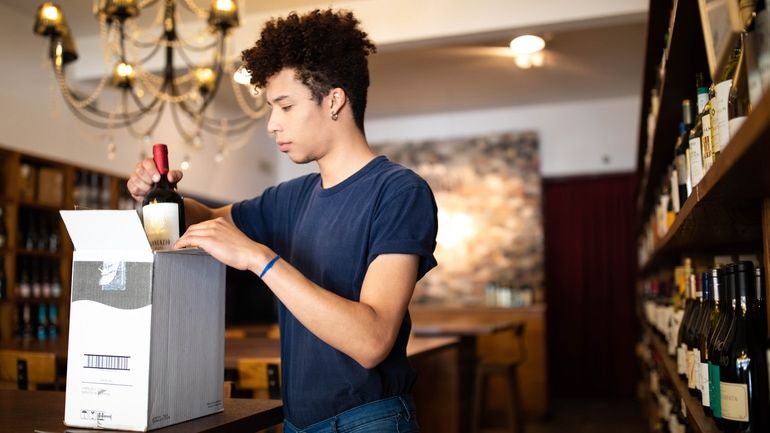
2023 Canadian Alcohol Delivery Laws by Province and Territory
Alberta
In Alberta, a Gaming, Liquor and Cannabis (AGLC) Regulation amendment was issued allowing licensed restaurants and bars to sell alcohol as part of their takeout and delivery services. The new temporary law, among other new measures, was announced in a March 2020 news release. Restaurants could now offer these services with no application process or fees, and use third party ordering platforms to deliver alcohol to consumers.
It was later announced that restaurants and bars could continue to offer alcohol delivery and pickup even after the end of the COVID-19 pandemic. This law was still in effect as of January 1, 2023. More information about these guidelines is available from the AGLC.
British Columbia
On Sunday, March 22, 2020, the B.C. government temporarily changed the province’s liquor laws to allow restaurants to deliver alcohol. Customers are only allowed to purchase alcohol if they are also purchasing a meal and other liquor laws still apply, such as age restrictions.
The temporary rule allowing restaurants and bars to sell alcohol for delivery and pickup was extended until March 31, 2021. Then, on March 12, 2021, the province announced that this provincial regulation was made permanent.
More information is available from B.C.’s Liquor and Cannabis Regulation Branch.
Manitoba
In response to pressure from Manitoba restaurant owners, Premier Brian Pallister announced that Manitoba will allow restaurants to sell alcohol for takeout and delivery orders. The new order applies to licensed establishments whose primary business is food, therefore all alcohol sales must be accompanied by orders of food.
On April 15, 2020, the new legislation was made permanent meaning restaurants can continue to sell sealed beer, wine, cider, and coolers for takeout and delivery even after the COVID-19 crisis. Details about the new guidelines are available from the Liquor, Gaming and Cannabis Authority of Manitoba.
New Brunswick
Back in April of 2020, New Brunswick temporarily permitted the sale of alcohol for takeout and delivery under the Emergency Measures Act.
Then, in December of 2020, the provincial government introduced amendments to the Liquor Control Act, which would make the alcohol delivery and takeout rules permanent.
On May 4, 2021, the province announced new amendments to the Liquor Control Act to allow restaurants to sell alcoholic drinks with takeout orders permanently. Changes to the act require employees to take an online training course, as outlined in the province’s news release.
For the latest updates to these rules, check with the Government of New Brunswick.
Newfoundland and Labrador
In Newfoundland and Labrador, alcohol delivery with food orders was officially made permanent in October of 2020. Alcohol can also be sold alongside takeout orders.
For more information about the new guidelines, visit the Newfoundland Labrador Liquor Corporation’s website.
Northwest Territories
In May of 2020, the Northwest Territories’ Department of Finance announced changes to the territory’s liquor regulations that allow for liquor delivery. According to the new rules, restaurants and bars must also establish their own alcohol delivery service, and cannot use private services or taxi drivers.
For the most up to date information, visit the NWT Liquor Licensing Board.
Nova Scotia
In March of 2020, Premier Stephen McNeil announced that alcohol can be sold with takeout orders indefinitely. However, the change has not yet become permanent.
On May 26, 2021, The Nova Scotia government announced new changes effective immediately to the Liquor Licensing Regulations. Restaurants are now allowed to include cocktails and mixed drinks for delivery or takeout with food orders while the state of emergency is in effect. As of January 1, 2023, these changes were still in effect.
More information is available from the Alcohol, Gaming, Fuel and Tobacco Division of Service Nova Scotia.
Nunavut
In Nunavut, no changes have been made to the territory’s alcohol delivery and pickup laws. For more information, check with the Nunavut Liquor and Cannabis Commission.
Ontario
In March of 2020, the Alcohol and Gaming Commission of Ontario announced a new measure permitting licensed restaurants and bars in Ontario to sell alcohol with takeout and delivery orders. Alcohol may also be sold for takeout or delivery through a third-party app (i.e. Uber Eats, Foodora, SkipTheDishes), provided they are acting on behalf of the licensee.
At the end of 2020, Ontario announced that it would permanently allow licensed restaurants and bars to include alcohol with food as part of takeout or delivery orders. Specific alcohol delivery guidelines are available from the Alcohol and Gaming Commission of Ontario.
Prince Edward Island
In December of 2020, Prince Edward Island announced that restaurants with a package sales license can permanently offer home delivery of alcohol to provincial residents, and that will continue going forward.
More information is available from the PEI Liquor Control Commission.
Quebec
In December of 2020, the Quebec National Assembly passed Bill 72, which allows restaurants to sell alcoholic beverages through third-party delivery apps (like Uber Eats, SkipTheDishes, and CHK PLZ) alongside food orders. Previously, only restaurant owners who conducted their own deliveries were able to deliver alcohol with a meal.
As for takeout orders, restaurants can sell alcoholic beverages in sealed containers (e.g., wine, beer, and cider, but not hard liquor containing over 7% alcohol content) for takeout as long as the alcohol is accompanied by some food.
More information about Quebec’s updated alcohol delivery rules is available from Quebec’s Alcohol, Racing and Gaming Authority.
Saskatchewan
As of November 2021, restaurants in Saskatchewan that hold a valid liquor permit can sell alcohol with takeout and delivery orders. Restaurants, however, will not be able to establish retail displays or have in-location shipping for takeout alcohol.
For the most recent updates, check with Saskatchewan’s Liquor and Gaming Authority.
Yukon
As of January 2022, the Yukon’s guidelines for bars and restaurants do not permit the sale of alcohol for takeout and delivery.
More information is available from the Government of Yukon website.
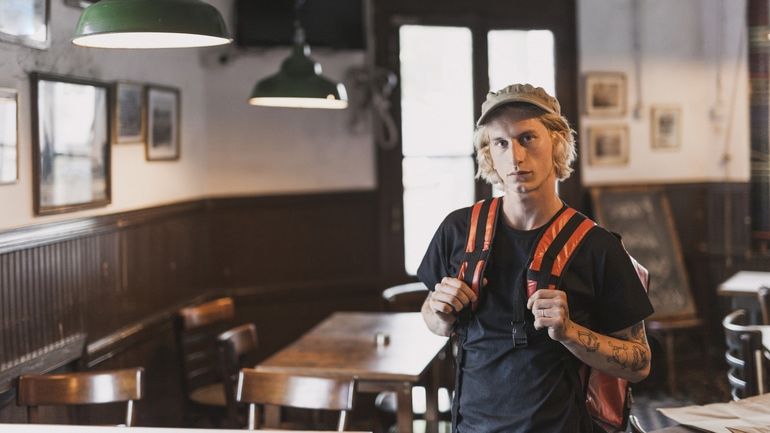
The Benefits of Alcohol Delivery for Your Restaurant
Though some restaurants have successfully pivoted to takeout and delivery, there is no doubt that generating enough revenue to stay afloat is still a major concern. But with the recent changes to alcohol delivery laws, selling alcohol to go may be an opportunity for some restaurateurs to bridge the gap.
Below are some of the major benefits of alcohol delivery for restaurants.
A Valuable Source of Revenue
In the restaurant industry, alcohol often has the highest profit margins because of high markups, a longer shelf-life, and lower labor costs behind the bar than in the kitchen. In fact, alcohol is responsible for 20% to 30% of restaurant sales across the U.S.
Though some of the pandemic-induced economic woes have subsided, it goes without saying that the ability to offer alcohol to go can still help restaurants generate some much-needed cash, especially in light of rising food costs.
Instead of letting pricey bottles sit on store shelves, restaurants can sell off these products and quickly free up cash flow. Not to mention, most states require the purchase of food with any alcohol deliveries, meaning that restaurants could see an increase in average check sizes for takeout and delivery orders.
A Way to Keep Staff on the Payroll
One of the most heart-breaking impacts of the COVID-19 dining restrictions was the massive layoffs – especially for FOH staff. Even for the restaurants that have largely recovered from the worst of the pandemic, many are operating with fewer staff members on hand in order to keep costs to a minimum.
With alcohol delivery now an option in most states and provinces, restaurants need staff on hand to facilitate the deliveries. As a result, many restaurants have been able to keep existing certain individuals employed or rehire restaurant staff to carry out alcohol deliveries. Though most restaurants cannot hire back their entire staff, the ability to keep some staff on payroll can make a huge difference in the face of extreme economic uncertainty.
An Opportunity to Use Up Leftover Ingredients
Since the start of the pandemic, nearly every restaurant has been forced to make some major menu adjustments. In some cases, this has meant experimenting with entirely new menu options, and abandoning certain dishes that aren’t selling or simply don’t travel well. Naturally, this has left a lot of restaurants with some unused inventory.
In most cases, states and provinces only allow alcohol delivery with food. Since restaurants need to offer food alongside drinks anyway, this serves as a great opportunity to use up excess ingredients. For instance, leftover cheese can be sold along with bottles of wine, while citrus fruits can be paired with cocktail mixes to create at-home mixology kits. Though it might take a bit of creativity, alcohol delivery naturally lends itself to food and drink pairings.
A Way to Unload Excess Alcohol Inventory
In the early days of the pandemic, many restaurants had to find a way to offload excess alcohol inventory. For some, the cancelation of events such as SXSW and St. Patrick’s Day festivities, means that they actually have more alcohol on hand (and less cash) than usual.
Even well into the pandemic, changing dining restrictions mean that many restaurants weren’t able to predict exactly how much alcohol to order.
For restaurants sitting on massive stockpiles of beer, wine, or liquor, alcohol delivery provides a way to unload excess inventory and recoup some of their costs. Even in the cases where restaurants have more alcohol on hand than they can sell, some of the changes to state liquor laws have allowed them to sell back unopened alcoholic products to manufacturers and distributors.
A Travel-Friendly Takeout Option
For some restaurants, adopting an off-premise restaurant model has been a rough road. For those that have never offered takeout or delivery, there are challenges involved in setting up an online ordering system, coordinating food delivery drivers, and figuring out which menu items are travel-friendly.
Though alcohol delivery certainly comes with its own challenges, beer, wine, and liquor are all travel-friendly products that lend themselves well to online ordering and no-contact delivery. Unlike food, which requires dedicated takeout food packaging, alcohol requires little to no additional packaging – provided you aren’t offering mixed drinks. Issues such as temperature and spoilage are also far less of a concern with alcohol than with food. For restaurants trying to pivot away from dine-in services, the ease of alcohol delivery can make a major difference.
3 Creative Ways Restaurants Are Selling Alcohol To Go
With alcohol delivery offering a potential beacon of relief, many restaurants are taking full advantage of the new opportunity. From takeout cocktails to Champagne on demand, here are some of the creative ways that restaurants are using alcohol delivery to keep their businesses afloat.
1. Creative Food and Drink Pairings
Most states and provinces that permit alcohol delivery and pickup require that orders be accompanied by a meal or food of some kind. As a result, many restaurants have come up with creative pairings for their food and drinks selections.
To cater to customers that are more interested in grabbing a nice bottle of wine than a full meal, New York City’s La Compagnie des Vins Surnaturels has been pairing its extensive wine list with snackable charcuterie boards. This clever pairing allows the wine bar to continue selling curated four-packs and six-packs of wine, without the need to keep the kitchen churning out gourmet meals.
Similarly, Brooklyn’s The Four Horsemen has nixed its $36 prix fixe meal takeout, and is now offering small snacks like Iberico ham chips with wine deliveries to keep kitchen costs to a minimum.
For other restaurants, food and drink pairing are a way to boost check sizes on takeout and delivery orders, rather than a way to keep kitchen costs down. For instance, L.A, taqueria Petty Cash is giving customers the option to add a bottle of four Petty Cash margaritas to the restaurant’s Taco Dinner meal deal, for just an extra $22.
2. DIY Cocktail Kits
Though not all states and provinces allow for the sale of hard liquor, some do. For restaurants in those areas, the ability to sell hard liquor has led to the sale of cocktail kits that customers can prepare at home.
For instance, Nice Guys in Cape Coral, Florida is serving up cocktail kits for its signature negronis, mules, mojitos, margaritas, and more. Each kit comes with bottles of liquor, as well as house mixers, garnishes, glasses, and detailed instructions.
Even cafes and breakfast joints have been able to take advantage of alcohol delivery by creating boozy brunch kits. For example, Houston’s Backstreet Cafe has created Bloody Mary Kits, as well as Mimosa Kits that include a bottle of bubbly and a choice of orange juice or wild berry mix.
And in states such as New York, where the delivery of pre-mixed cocktails is permitted, some restaurants are offering bulk ordering of their signature drinks. For instance, Patent Pending previously offered large-format cocktail delivery and is even threw in a free roll of toilet paper for orders over $50.
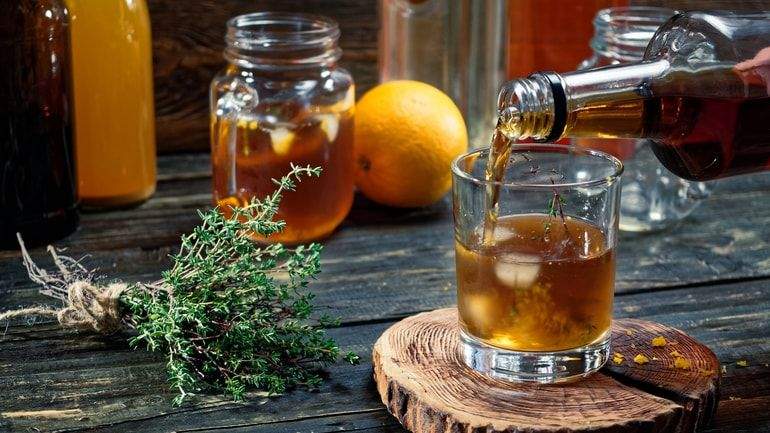
3. Happy Hour Pricing
To boost alcohol sales, some restaurants have created special promotions to encourage delivery orders. Many are even branding their promotions as a new type of happy hour for the ever-expanding group of work-from-home employees.
In Chicago, Roots Pizza is one restaurant offering a happy hour delivery discount. From 3 p.m. to 6 p.m., customers can use a special code in the Roots app to enjoy half-off beer, wine, and White Claw.
In Austin, Cured at Pearl has extended happy hour even further, offering half-off drinks between 3 p.m. and 8 p.m.
And in some cases, restaurants are offering discounts all day long for customers that really need to unwind. For instance, Vancouver’s Homer St. Café and Bar is offering half-priced bottles of wine and $4 cans of beer to go with any food order – all day long. The restaurant is also offering six-packs for just $15.
There’s no question that alcohol delivery offers restaurants a beacon of hope during very trying times. Whether that means large format cocktail kits or six-packs for at-home happy hours, alcohol delivery can help restaurants stay open, keep staff on the payroll, and ultimately weather the storm of ongoing financial challenges. In some cases, these looser liquor laws have already become permanent, giving restaurants a valuable source of revenue as they try to achieve financial stability.
